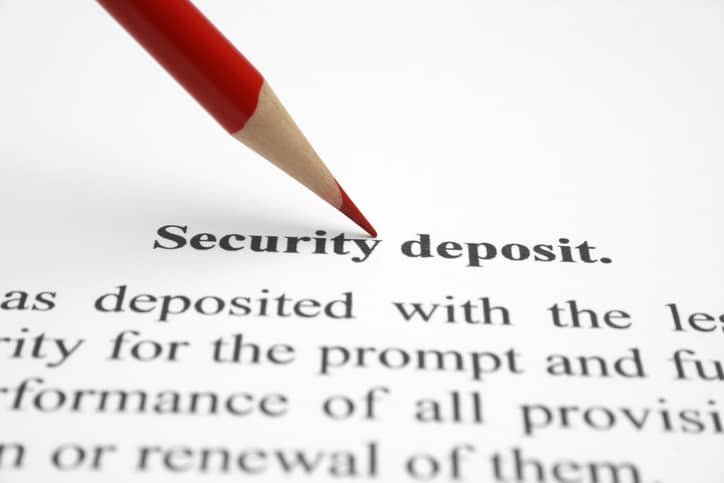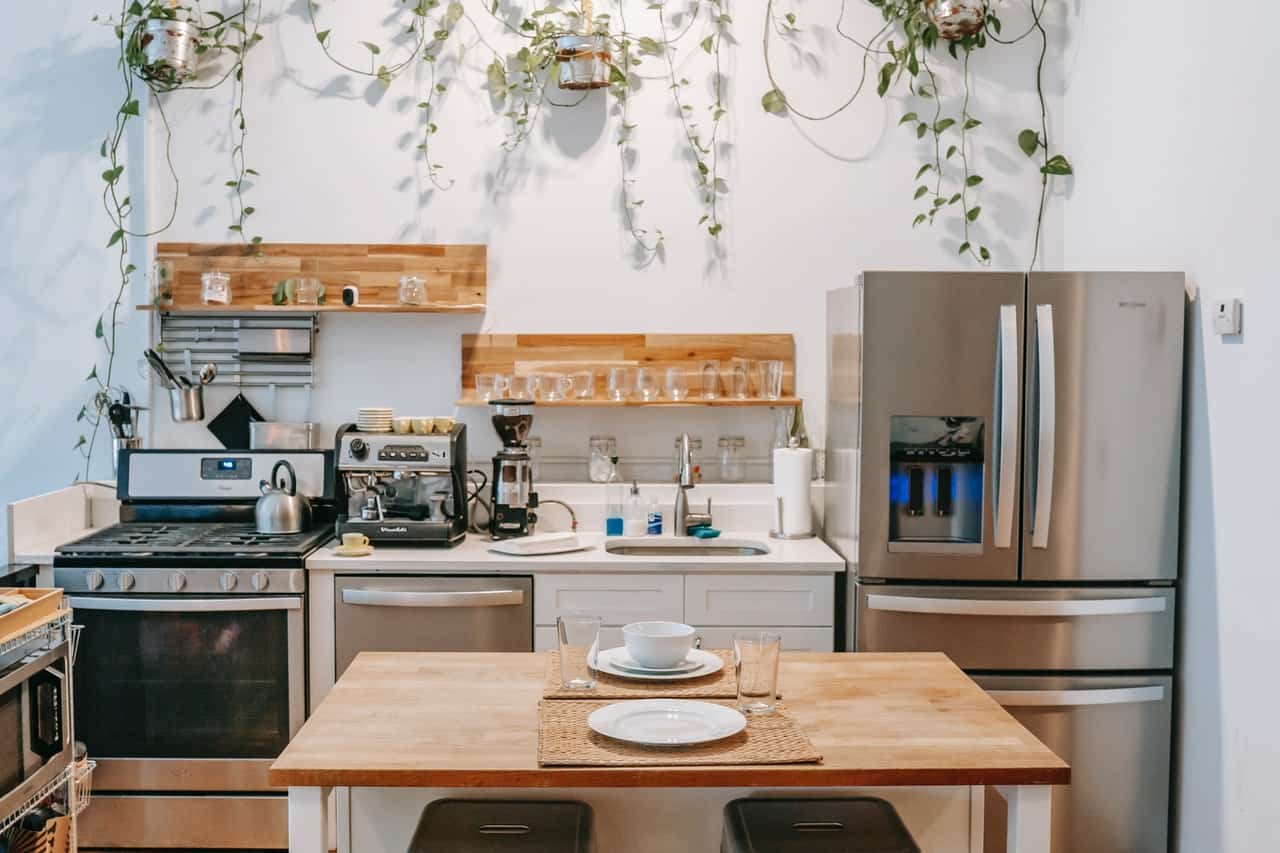Signing an apartment lease is part of every renter’s journey and involves agreeing to pay for utilities, deposits, and fees.
When you sign a lease, you’ll be expected to pay a certain amount of money in security deposit upfront.
With that said, what does a security deposit involve, and is it refundable? Before you sign the lease, ensure you understand what security deposits cover.
Let’s look at some critical information you need to understand about the security deposit.
Are Security Deposits for Apartments Refundable?
Before we look at whether security deposits are refundable or not, we must understand what they involve.
What’s a Security Deposit?
Security deposits involve the fixed amount that a tenant pays to a landlord or property manager to ensure that the tenant follows the lease and pays the rent on time.
In most cases, you’ll pay your security deposit before settling on the property. The landlord or property manager holds onto the money until the end of the lease or term of the stay.

The amount of the security deposit typically equals around one month’s rent, however different states have different laws that dictate this amount. For instance, some states set the maximum amount that a landlord can charge for security deposits at a month and a half’s worth of the rent.
Property managers may opt for larger security deposits if the tenant has a low credit score. Most landlords interpret the low score to mean that you don’t always make your payments on time.
Since many landlords ask for security deposits, it would help to factor it into your move-in budget. Understanding your credit score, the state you reside in and the local laws can help you prepare for a big move.
Difference Between Security Deposit and Move-In Fees
Ensure that you don’t confuse your security deposit with move-in fees.
While the security deposit ensures that you pay the rent on time and follow the lease, the move-in cost is a small non-refundable fee, typically equating to the first month’s rent, but can sometimes also include the last month’s as well.
It’s upon the landlord to include the move-in fee on the payments made by tenants. In most cases, move-in fees are based on services offered by the landlord before a new tenant occupies an apartment.
The main differences between a move-in fee and a security deposit include:
- Move-in fees aren’t refundable, while the security deposit is refundable
- A security deposit typically costs more than a move-in fee
- A move-in fee isn’t regulated, while a security deposit is regulated
Are Security Deposits Refundable?
Is an apartment security deposit refundable? Well, YES, but the answer might be more complicated than a simple No or Yes.
For instance, if you leave your rental property in good condition, you’ll have the security deposit returned to you.
A landlord or property manager will only spend your security deposit for two reasons:
- You cause damage to the apartment that’s beyond normal wear and tear
- You owe them past due rent or other payments
The landlord is allowed to channel your entire security deposit towards the replacement or repair of something you damaged. This may include a damaged window or door.
However, most states, including Michigan, have laws regulating how landlords and property managers employ the security deposit process.
Landlords are likely to deposit the money in an interest bearing account. The law requires you to get the security deposit, minus the expenses, noted during a move-out inspection, upon moving out of the rental unit.
It helps to understand the landlord-tenant laws and regulations in your area. Even though the security deposit is refundable, the property manager has several legal reasons to hold onto it, as we’ll see later.
How Much is the Security Deposit?
Even though some states don’t limit the amount that a landlord or property manager can charge on a security deposit, most set the security deposit limit at around one month’s rent.
With that said, some states allow property managers and landlords to charge as high as three months rent, but you also may find places that charge as little as $100 as the security deposit.
The estimated cost of a security deposit typically depends on your background check and credit score.
How is the Security Deposit Calculated?
Landlords and property managers have five factors in mind while calculating their apartment’s security deposits:
- The monthly rent cost
- The state laws
- Security deposits of related and competitive properties
- The quality and type of apartment amenities
- Rental application of the tenant, including their employment history, credit score, criminal history, etc.
A tenant with a good score may be seen as less of a risk for moving out unexpectedly or neglecting to pay rent, compared to someone with a lower score.
In another situation, a tenant who doesn’t earn at least three times their monthly rent might struggle to pay the full rent every month.
Due to such cases, some landlords may seek a higher security deposit from those tenants to offset the risk of losing money.
Difference Between Last Month’s Rent and Security Deposit
If the lease states that the security deposit will be considered in the final rent, the money will only go towards rent payments. The payment won’t be refunded to you or used for damages to the apartment.
If your property manager or landlord only requires the last month’s rent upfront and doesn’t need a security deposit on top of the payment, they have taken financial responsibility to repair any itemized list of damages made by the tenant, upon move out.
The security deposit is, therefore, totally different from last month’s rent.
When to Pay the Security Deposit
In most cases, your property manager will require you to pay the security deposit before you move into the apartment or receive the keys.
If you want to be safe, pay the security deposit at the signing of your lease using an ACH payment, cashier‘s check, or money order.
Ensure you have enough money for the first month’s rent and security deposit before signing the lease. This way, you’ll have no problems when moving in.
When to Get the Deposit Back
If you do deserve to receive your deposit back, you can expect it between 30 to 60 days after you have vacated the unit, depending on the state.
Since you’ll most likely receive the security deposit back in the form of a check by mail, ensure you notify the landlord or property manager of your new forwarding address.
Reasons Why Landlords Don’t Refund the Deposit
There are times when you won’t receive the full amount of your security deposit back. Below are situations that might force your landlord to hold onto some or all of the security deposit:
Termination/Breaking the Lease Early
Suppose a tenant terminates or breaks the lease. In that case, the property manager is allowed, by law, to keep part or all the security deposit, whichever is necessary to cover the costs related to the breach. The exact amount the landlord keeps depends on your state laws.
If there is an early termination in the lease, the landlord will be forced to abide by the terms. If the landlord takes legal action against you, they might charge you attorney fees and court costs.
Unpaid Rent and Utilities
You stand a chance of losing your security deposit if you owe your landlord unpaid costs, such as:
● Unpaid rent
● Unpaid utilities
● Unpaid municipal permit fees
By law, the landlord can keep part or all of the deposit to cover any of the above costs. So ensure you pay any rent owed to the landlord.
As a tenant, you should take the necessary steps before you move out of your apartment to avoid losing the security deposit:
- Give an advance notice: Check your rental agreement to understand the clause talking about the termination of your lease. The lease has the information on the notification you must give before the move-out date.
In most cases, the ideal time you‘re supposed to give the notification is 30–days before the end of your lease.
Make sure that you give the notice in writing rather than relying on a spoken word. If you delay giving the notice, you risk losing your security deposit.
- Separate rent from your security deposit: Many tenants think their security deposit is their last month’s rent. Unless you agree to such an agreement with your landlord, you’ll be required to pay your last month’s rent separate from the deposit.
- Provide your new address: You need to give your new address to your landlord to make it easier for them to return your security deposit.
Even though the security deposit is refundable, you must ensure that the apartment is in good condition, you’ve made all of the past payments on time and that you are current on any outstanding debt.
This is the only sure way of getting your security deposit back when you relocate to another place.
Damaging the Apartment
Most tenants lose their security deposits if they cause damage to the apartment. Ensure you leave the apartment in good condition when you decide to leave it, which includes:
- Put everything back to its original condition: If you changed the arrangement of window treatments or furniture, change them back.
- Remove screws and nails: If you put screws or nails in the ceilings or walls, ensure you take them out and fill the holes properly.
- Replace any broken items: Broken tiles, loose shelves, and essential items that require replacement or fixing must be taken care of before you move out. Neglecting them doesn’t amount to wear and tear.
- Clean up: For instance, clean the appliances and bathroom, including scrubbing the oven. If you don’t, you risk finding a deep-cleaning fee on the list of your security deposit deductions.
- Inspect the property with the landlord or property manager: Before you move out, ensure you inspect the rental with your landlord. The landlord may allow you to fix some issues and point out things you didn’t notice.
Items that are typically considered normal wear and tear:
- Dirty grout
- Some small nail holes on the walls
- Minor stains on the carpet that can come out
- A certain amount of dust, grime, or dirt on the walls, floors, or appliances
- A certain amount of mildew accumulating in grout lines
- Tarnish on bathroom fixtures
- Loose handles on bathroom cabinets or doors
Items that typically constitute as damage:
- Broken doors
- Broken windows
- Missing outlet covers
- Large/multiple holes in the walls
- Holes or huge stains on the carpet
- Broken bathroom vanity
- Extensive water damage on the hardwood floors
- Lost keys at the end of your lease
- Cracked bathroom countertop or kitchen
- Damaged or missing carbon monoxide or smoke detectors
If You Haven’t Received the Deposit
Check the lease agreement for the period you’re supposed to receive the deposit after the lease expires. If it’s more than the time given by either state laws or the lease, reach out to the landlord by email, phone, or personal visit to remind them of the same.
In such a case, the landlord owes you your deposit and should refund it as soon as possible.
If you think it qualifies being a legal issue, you can file your claim in a small claims court.









